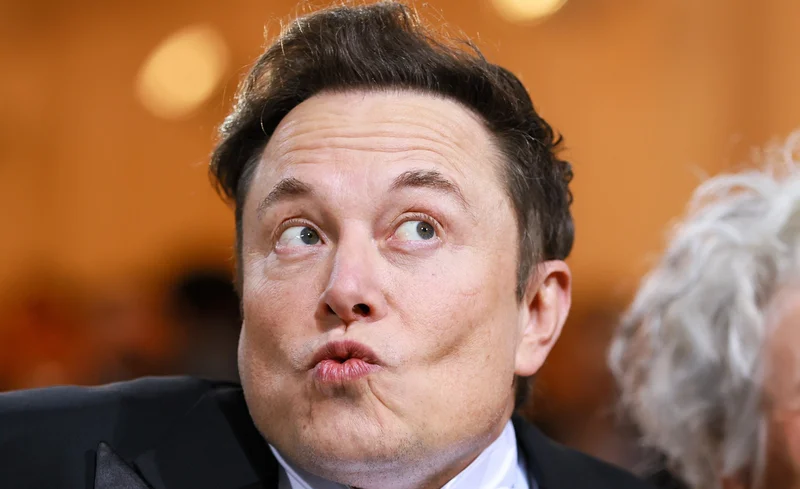Generated Title: Elon's Trillion-Dollar Fantasy: A Data Analyst's Reality Check
Okay, so everyone's buzzing about Elon Musk's potential trillion-dollar pay package. The headlines practically scream it: "Musk on Track to Be First Trillionaire!" But let’s pump the brakes for a second and actually look at the numbers. The story, as usual, is far more nuanced than the hype suggests.
The Devil's in the Deliverables
The core of this whole thing hinges on Musk hitting some truly audacious targets. We're talking a million robotaxis, a million Optimus robots, and Tesla’s market cap ballooning to $8.5 trillion—more than six times its current value. (For context, even Nvidia, the current darling of AI, only just nudged past $5 trillion.) Those are some seriously high bars. Are they even remotely achievable?
Musk's track record with deadlines isn't exactly confidence-inspiring. Remember the million robo-taxis by 2020? As of now, we're closer to two hundred. And the Cybertruck, projected at 250,000 units per year? Actual sales are lagging far behind, closer to 70,000 this past fall. It's a pattern: grand promises, followed by… well, let's just call it "under-delivery." The self-driving claims deserve their own Wikipedia page.
He needs to deliver, big time, on the promise of humanoid robots. Tesla is explicitly demanding that he build and sell an army of 1 million robots. "Enormous robot army" is a term he said out loud. This army, he promises, will revolutionize the labor force and the economy and solve several of humanity’s biggest problems (as for which ones exactly, that seems to depend on the day). During Tesla’s quarterly earnings call last week, he told Wall Street investors that he needed his new compensation deal not because he wanted the money but to ensure that he controls enough Tesla stock to retain influence over the robot army after he creates it. Musk's trillion dollar pay deal hinges on humanoid robots – DW – 11
The Cult of Personality vs. Cold, Hard Cash
Tesla shareholders approved the pay package, with 75% voting in favor. But here's a crucial point: votes were weighted by share ownership. Musk, with his 12% stake, got to vote his own shares, which skews the numbers. So, it wasn't quite the overwhelming mandate it appears to be at first glance.
There seem to be two distinct camps of Musk supporters among Tesla shareholders. First, you've got the die-hard fans, the ones who’ve bought into the cult of personality. Given Musk's controversial public persona, Tesla probably has a higher percentage of these "parasocial shareholders" (verified X users, MAGA devotees) than most companies. These folks aren't necessarily looking at spreadsheets; they're buying into a narrative.
Then there's the second group: the pragmatists. They recognize the risks, but they believe Musk is still the best bet for keeping the stock price afloat. Tesla's market cap is wildly overvalued compared to its actual car sales. It's a midsize car company trading like a tech behemoth. This overvaluation is fueled by Musk's promises and, let's be honest, his political connections. The fear is that without Musk at the helm promising infinite riches, Tesla becomes just another car company facing structural challenges.

And this is the part of the report that I find genuinely puzzling. These are sophisticated investors, aren't they? Do they really believe Musk's hype over any other CEO? The data just doesn't support that conclusion.
The Storytelling Economy: Smoke and Mirrors?
We're living, as some analysts have pointed out, in a "storytelling economy." Companies are selling visions of the future, using narratives to mask present-day weaknesses. And Musk, perhaps more than anyone, is a master storyteller.
Musk accused of too many distractions. He was already criticized for taking his eye off the ball earlier this year when he joined the Trump administration as the head of DOGE (Department of Government Efficiency — not the meme coin). His brief stint at DOGE triggered a backlash that spilled into Tesla's operations, with protests outside factories, calls for boycotts and even sabotage incidents that disrupted production and dented investor confidence. Musk stepped down from DOGE after just 130 days, and in July launched his new political movement, the America Party, aiming to challenge the two-party system and reshape national discourse.
This pay package feels less like a plan to build a solid company and more like a license for Musk to indulge his worst tendencies: overpromising, hyping unproven technology, and playing fast and loose with the truth. He gets paid for driving up share prices? Expect bigger promises, more outlandish claims. He gets paid for flooding the streets with self-driving taxis? Fine, he'll lobby politicians to approve them, safety be damned.
The Real Trillion-Dollar Question
So, will Musk become the world’s first trillionaire? Probably not. But there are easier targets in the pay package, ones worth tens of billions if Tesla's value inches up and sales don’t completely tank. He'll still be obscenely wealthy, just not trillionaire wealthy.
But the real question isn't about Musk's bank account. It's about the system that allows this kind of thing to happen in the first place. Is it healthy for the economy, or even for democracy, when a single individual wields this much power and influence? The numbers suggest the answer is a resounding "no." What the Rise of Trillionaires Could Mean for the World
A Very Public Overpay
The numbers here suggest that this isn't about a functional business plan, it's about the perpetuation of a narrative. The kind of narrative that the markets love, but one that is often detached from reality.
